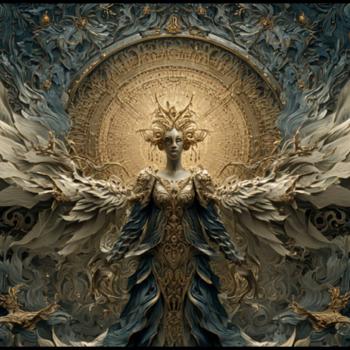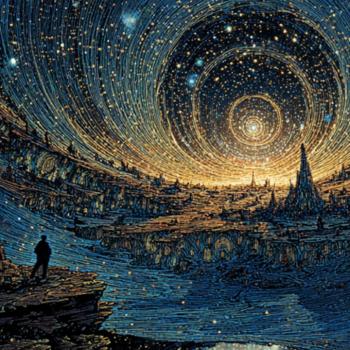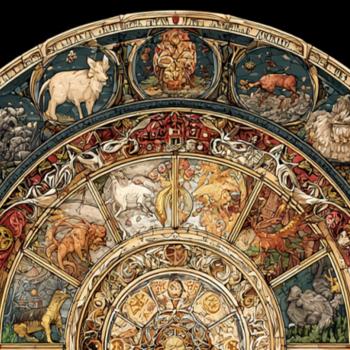
Yesterday I had a wonderful conversation with Father Kenneth Tanner. During our talk, he referenced a quote from Athanasius that got my wheels turning.
What he mentioned was that the early Church Father had taught something about the Incarnation of Christ being a journey, not an event in time, where Jesus became fully human only when he died on the cross.
That really got me thinking and so I started to dig into this quote, and into what the early Church Fathers believed about the Incarnation, and that led me to study more about what they believed about the process of Deification within humanity.
Here’s where this little earworm has taken me so far…
First, we’ll start with these quotes from Athanasius who was the Bishop of Alexandria and lived between 296 and 373 A.D.
“The Word was made flesh in order that we might be made gods. … Just as the Lord, putting on the body, became a man, so also we men are both deified through his flesh, and henceforth inherit everlasting life.”
“For the Son of God became man so that we might become God.”
“He was made human so that he might make us gods“
Now, of course, this teaching isn’t unique to Athanasius. In the Gospel of John we see the Lord Jesus Himself quoting from the Old Testament scriptures to show us that God has already said that we are gods:
The Jews answered him, saying, For a good work we stone thee not; but for blasphemy; and because that thou, being a man, makest thyself God. Jesus answered them, Is it not written in your law, I said, Ye are gods? If he called them gods, unto whom the word of God came, and the scripture cannot be broken; Say ye of him, whom the Father hath sanctified, and sent into the world, Thou blasphemest; because I said, I am the Son of God? [John 10:33-36]
The Apostle Paul picks up on this notion and affirms this in his own epistles, for example, in 2 Corinthians 3:17–18 he says that “we all, with unveiled face, beholding the glory of the Lord, are being transformed into the same image from one degree of glory to another.”
He also said: “Now if we are children, then we are heirs—heirs of God and co-heirs with Christ, if indeed we share in his sufferings in order that we may also share in his glory.” [Romans 8:17]
And the author of 1 John affirms this also saying:
“Beloved, now we are the sons of God, and it doth not yet appear what we shall be; but we know that, when He shall appear, we shall be like Him; for we shall see Him as He is.” [1 John 3:2]
Apparently, this teaching about the Deification of humanity can be found as early as the writings of Irenaeus, a Greek leader in the early Church of Lyons (130-202 A.D.) who said that God had “become what we are, that He might bring us to be even what He is Himself.”
He also said: “Do we cast blame on him [God] because we were not made gods from the beginning, but were at first created merely as men, and then later as gods? Although God has adopted this course out of his pure benevolence, that no one may charge him with discrimination or stinginess, he declares, “I have said, Ye are gods; and all of you are sons of the Most High.” … For it was necessary at first that nature be exhibited, then after that what was mortal would be conquered and swallowed up in immortality.”
Deification or Divinization of Christians was understood to be a process that took place during the receiving of the Eucharist. This was widely taught by early Church Fathers like Gregory of Nyssa and Cyril of Alexandria.
However – and we need to stress this here – this teaching never crossed the line into suggesting that Christians become God [with a capital G]. It only suggested that those who were in Christ were being made in the image of God to become like God. More specifically, they believed that Christians were those who were literally Incarnating Christ in their own bodies due to the indwelling and transforming Spirit of Christ that lived within them. Sort of like the doctrine of Sanctification turned to eleven.
This doctrine was not an isolated one. In fact, there were numerous references to this process of Deification or Divinization of believers in the writings of the early Christians, for example:
Clement of Alexandria (150–215 A.D.)
“Yea, I say, the Word of God became a man so that you might learn from a man how to become a god….if one knows himself, he will know God, and knowing God will become like God. . . . His is beauty, true beauty, for it is God, and that man becomes a god, since God wills it. So Heraclitus was right when he said, ‘Men are gods, and gods are men’…”…he who obeys the Lord and follows the prophecy given through him … becomes a god while still moving about in the flesh.'”
Justin Martyr (100–165 A.D.)
“[In the beginning] men were made like God, free from suffering and death,” [and now are] “deemed worthy of becoming gods and of having power to become sons of the highest.”
Even the great Augustine of Hippo (354-403 A.D.) said this:
“But he himself that justifies also deifies, for by justifying he makes sons of God. ‘For he has given them power to become the sons of God’ [referring to John 1:12]. If then we have been made sons of god, we have also been made gods.”
“To make human beings gods, He was made man who was God…[they] are not born of His Substance, that they should be the same as He, but that by favour they should come to Him…”
And it doesn’t end there. Not by a long shot.
Irenaeus (130-200 A.D.)
“[T]he Word of God, our Lord Jesus Christ, who did, through His transcendent love, become what we are, that He might bring us to be even what He is Himself.”
“‘For we cast blame upon [God], because we have not been made gods from the beginning, but at first merely men, then at length gods; although God has adopted this course out of His pure benevolence, that no one may impute to Him invidiousness or grudgingness he declares, “I have said, Ye are gods; and all of you are sons of the Most High.” “
“For it was necessary, at first, that nature should be exhibited; then, after that, that what was mortal should be conquered and swallowed up by immortality, and the corruptible by incorruptibility and that man should be made after the image and likeness of God.”
Theophilus of Antioch (120-190 A.D.)
“For if He had made him immortal from the beginning, He would have made him God. Again, if He had made him mortal, God would seem to be the cause of his death. Neither, then, immortal nor yet mortal did He make him, but, as we have said above, capable of both; so that if he should incline to the things of immortality, keeping the commandment of God, he should receive as reward from Him immortality, and should become God…”
Hippolytus of Rome (170-235 A.D.)
“And you shall be a companion of the Deity, and a co-heir with Christ, no longer enslaved by lusts or passions, and never again wasted by disease. For you have become God: for whatever sufferings you underwent while being a man, these He gave to you, because you were of mortal mould, but whatever it is consistent with God to impart, these God has promised to bestow upon you, because you have been deified, and begotten unto immortality.”
“If, therefore, man has become immortal, he will also be God. And if he is made God by water and the Holy Spirit after the regeneration of the laver he is found to be also joint-heir with Christ after the resurrection from the dead.”
Gregory of Nyssa (335-395 A.D.)
“Since the God who was manifested infused Himself into perishable humanity for this purpose, viz. that by this communion with Deity mankind might at the same time be deified, for this end it is that, by dispensation of His grace, He disseminated Himself in every believer.”
“For just as He in Himself assimilated His own human nature to the power of the Godhead, being a part of the common nature, but not being subject to the inclination to sin which is in that nature (for it says: “He did no sin, nor was deceit found in his mouth), so, also, will He lead each person to union with the Godhead if they do nothing unworthy of union with the Divine.”
Maximus the Confessor
“Nothing in theosis is the product of human nature, for nature cannot comprehend God. It is only the mercy of God that has the capacity to endow theosis unto the existing… In theosis, man (the image of God) becomes likened to God, he rejoices in all the plenitude that does not belong to him by nature, because the grace of the Spirit triumphs within him, and because God acts in him.”
Cyril of Alexandria
“[H]e came down into our condition solely in order to lead us to his own divine state.”
“It follows, therefore, that He Who Is, The One Who Exists, is necessarily born of the flesh, taking all that is ours into himself so that all that is born of the flesh, that is us corruptible and perishing human beings, might rest in him. In short, he took what was ours to be his very own so that we might have all that was his.”
“For we too are sons and gods by grace, and we have surely been brought to this wonderful and supernatural dignity since we have the Only Begotten Word of God dwelling within us.”
Gregory of Nazianzus
“become gods for (God’s) sake, since (God) became man for our sake.”
[The Spirit of God] pleads even now as Man for my salvation; for He continues to wear the Body which He assumed, until He make me God by the power of His Incarnation.”
“Through the medium of the mind he had dealings with the flesh, being made that God on earth, which is Man: Man and God blended. They became a single whole, the stronger side predominating, in order that I might be made God to the same extent that he was made man.”
Basil of Caesarea
“becoming a god is the highest goal of all”
St. Thomas Aquinas
“Now the gift of grace surpasses every capability of created nature, since it is nothing short of a partaking of the Divine Nature, which exceeds every other nature. And thus it is impossible that any creature should cause grace. For it is as necessary that God alone should deify, bestowing a partaking of the Divine Nature by a participated likeness, as it is impossible that anything save fire should enkindle.”
[whew] That’s a LOT of support, wouldn’t you say?So, what are we to make of this?
I think this is a lost teaching of the early Christian Church we might want to explore a bit further. At least, it’s one that I would like to dust off and examine a little more.
What fascinates me most is this: The idea that Christ’s journey to becoming fully human culminated in his death, and that Jesus’s journey to become fully Christ was culminated in his resurrection.
Honestly, that’s essentially the idea that I took away from my conversation with Fr. Kenneth Tanner the other day. This parallel “becoming” of both Christ and Incarnate Human taking place in the body of Jesus all at once.
Now, I know that’s another stretch for many of us. But the New Testament really does say that Jesus was “made the Christ” or that he “became Christ” which suggests this was a process, not a moment in time at his birth.
“Therefore let all Israel know with certainty that God has made this Jesus, whom you crucified, both Lord and Christ!”’ [Acts 2:36]
Many early Church Fathers taught that Jesus became the Christ [which literally means ‘the Anointed One’] at his baptism because this was when the Spirit of God was poured out on Jesus and God said, ‘This is my Son'”
Others taught that Jesus became the Christ at his death, or even at the resurrection. But, at any rate, there was a pervading notion that Jesus became the Christ over time and through a process of obedience to the Father throughout His life.
Yes, we also see that Christ was in Jesus and that the Word of God existed prior to the Incarnation. So, all of these ideas taken together seem to suggest the possibility that both the Incarnation of Christ in the body of Jesus was a process, and the total revelation of Jesus as the Christ was also a process.
That’s what has me reeling: The Incarnation of Christ wasn’t complete until Jesus died. Jesus did not fully become the Christ until the resurrection.
That’s fascinating stuff.
And then, of course, meditating on how this same process of becoming like Christ is now taking place within me, and you, and all of us, as we are being made new and transformed into the image of Christ. A process that will culminate in our death, and in our own resurrection where we see Him face to face and become like him by sharing in His sufferings.
Does this make anyone else wonder about the process of Incarnation and Deification? Am I the only one who reads these quotes and starts to meditate on the implications?
Maybe so. Either way, I’ll be noodling on this one a bit longer. Blog posts to follow.
I’d love to hear your comments.
Blessings,
Keith
**














